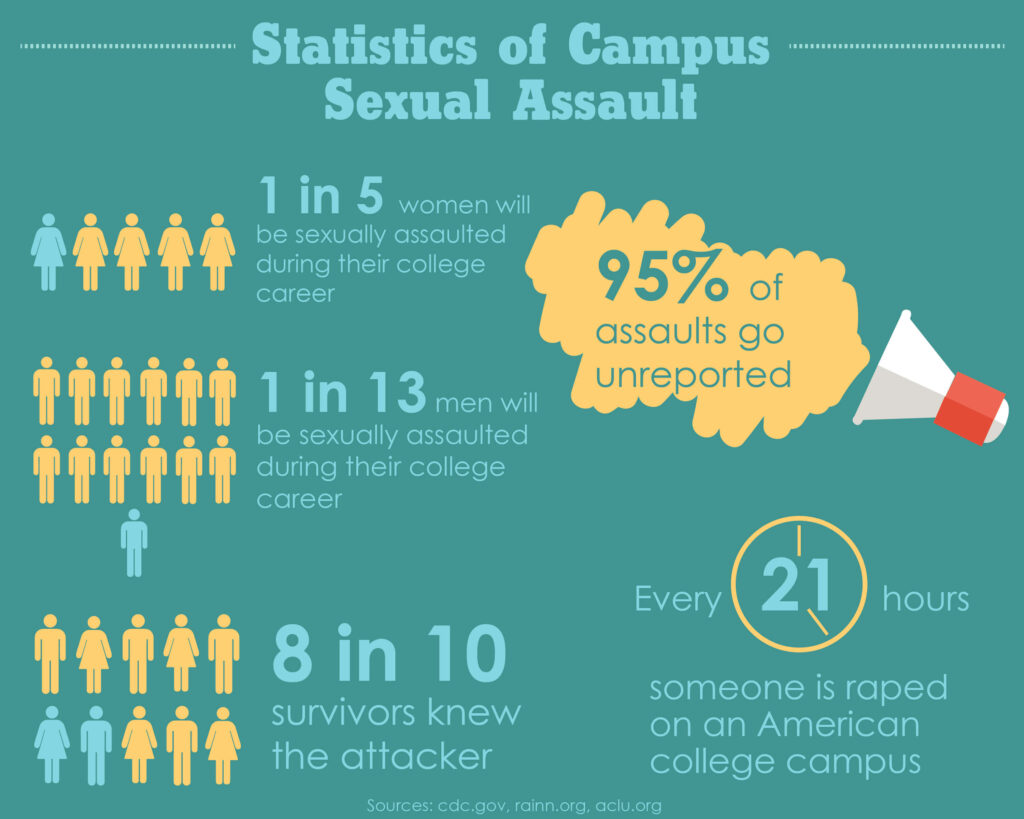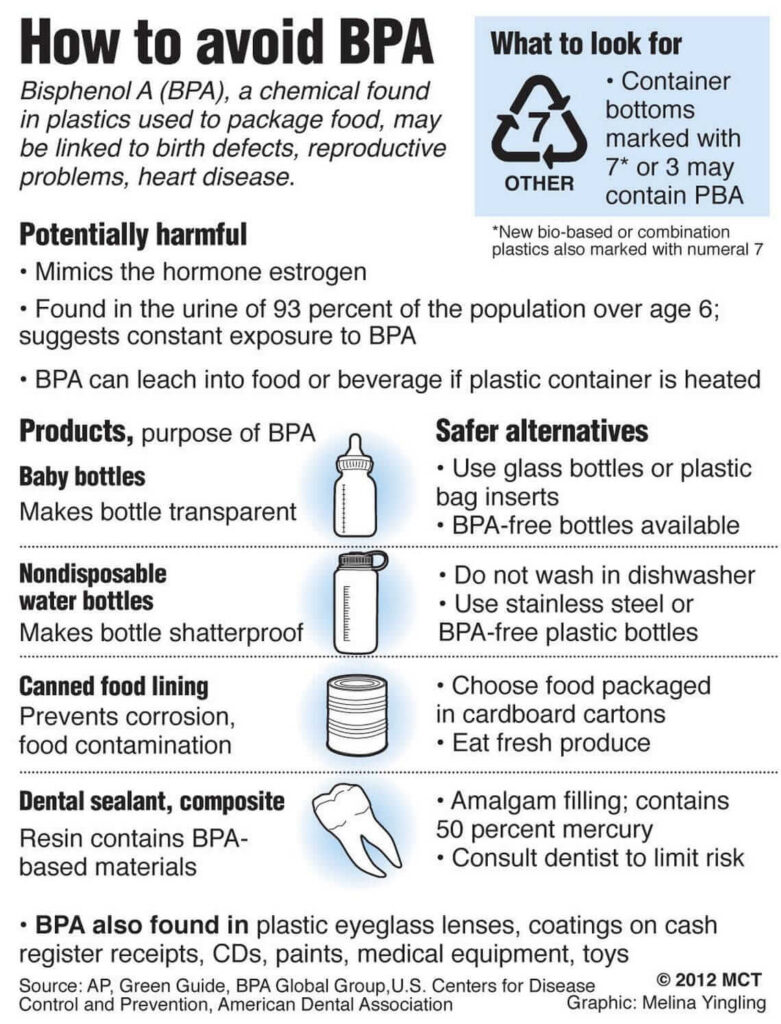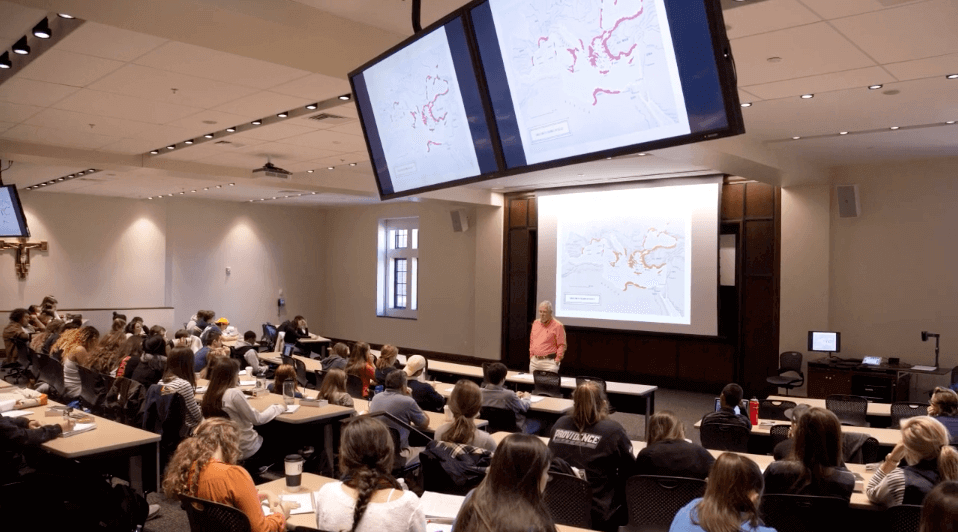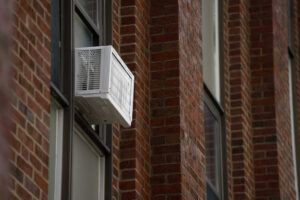Tag: Alyssa Cohen ’21
The War(ren) on Female Politicians: Media Harms Warren’s Campaign for Presidency
by The Cowl Editor on January 17, 2019
Opinion

that she was launching a presidential exploratory committee. Photo courtesy of Steven Senne/AP/Shutterstock.
On December 31, 2018, Elizabeth Warren released a video announcing her plan to launch an exploratory campaign for the 2020 presidential election.
Warren is the harbinger of an inevitable surge of campaign announcements from prominent Democrats, and according to boston.com, the 2020 election may include as many as two dozen Democratic candidates.
However, Warren’s announcement has been surrounded by significant, yet unsurprising negative reception, as the American consensus, including that of her home state of Massachusetts, fails to endorse her presidential run.
The extreme criticism of Warren’s campaign, for such a wholesome politician, raises inquiry: What makes Warren so “unlikable” to the American public?
A semblance of an answer to this question can be found in the political circumstances that have brought Warren to the national limelight in recent years.
One such circumstance is her persistence to impugn Jeff Sessions in his nomination for attorney general by President Trump after an attempt to be silenced by the Republican party. This event begot the popular phrased adopted by the feminist movement, “Nevertheless, she persisted.”
Warren’s presence as a spitfire in the public forum, especially in upholding her beliefs, inevitably established her political presence as antagonistic to the Republican party, thus subjecting Warren to Trump’s harsh ridicule.
Following Hillary Clinton, Trump’s opponent in the 2016 presidential race, Warren became one of Trump’s favorite politicians to vilify. To that end, the consistent reappearances of Warren’s name on numerous public platforms attached to negative buzzwords coined by President Trump, has undoubtably sullied her reputation with the American public within both pro-Trump and anti-Trump communities alike.
Thus, Trump continued to lampoon Warren’s character after she announced that she would be launching an exploratory campaign for the 2020 election in an interview by Fox News. Trump was asked if he thought Warren believed she could defeat him in an election. His response: “I don’t know, ask her psychiatrist.”
Trump’s belittling commentary, as well as the decision of Fox News to probe Trump with this question, illustrates a media-charged effort by sectors of the right to desecrate Warren’s name.
Additionally, the fact that Warren is a woman cannot be overlooked in an assessment of the reluctance of the American public to endorse her as a political leader. While her politics alone already lose her the votes of conservatives, as they are somewhat comparable to those of her left-wing counterpart, Bernie Sanders, her social presence as an empowered and outspoken woman has lost her the support of a large percentage of the left as well.
Many Democrats will openly criticize Warren for her “aggressive tone” and “confrontational personality,” traits that can typically be attributed to male politicians. Moreover, many will use such characteristics to justify a reluctance to support Warren, in turn, revealing an adherence to unconscious gender biases.
While Warren is far from a consummate presidential candidate, as her controversial decision to consider herself of Native American ancestry has lost her some credibility amongst the American public, this incident remains the only blemish of Warren’s otherwise clean political record. Warren’s background is significantly less corrupt than most prominent politicians today.
In turn, the enduring negative reception of Warren’s campaign announcement, which will ultimately hinder any hope of her success in the 2020 race, appears to be deeply rooted in her vilification from President Trump and various sources of news media, rather than in a political or ethical discrepancy between Warren and American majorities.
To that end, as Americans, we can only hope that our counterparts will look beyond popular opinions, superficiality, and media biases, and evaluate incumbent candidates based upon their humanity, plans to benefit the welfare of all citizens, and effectiveness of said candidate’s plan to achieve their goals.
Beyond Huxley Gate: Explore All Providence Has to Offer
by The Cowl Editor on November 29, 2018
Opinion

by Alyssa Cohen ’21
Opinion Staff
As Providence College students become entranced by the ambiance of the ever increasing beauty of the College’s campus, the PC bubble grows stronger and more resilient.
While there is plenty to do on campus because of the College’s extensive extracurricular activities, Board of Programmers (BOP) events, and McPhail’s, as well as the booming nightlife on campus, students display little drive to explore life off campus in the city of Providence.
Although the city itself is frequently acknowledged for being small and “insignificant,” this stereotype is conflated with the idea that Providence is a boring place—a sentiment that could not be further from the truth.
While most PC students are acquainted with the Providence Place Mall for shopping, Thayer Street for various activities, and Federal Hill for a fancy dinner for a friend’s birthday or when family comes to visit, so much of the city’s beauty remains unexplored by the typical PC student.
For example, PC students rarely venture over to Wickenden Street, an area of Providence that rivals Thayer Street in terms of eclectic eats, and offers many small vintage clothing, vinyl, and antique stores, along with a potpourri of coffee shops and brunch restaurants including The Duck and Bunny and The Coffee Exchange.
Additionally, while PC students are likely familiar with the Roger Williams Park Zoo, very few students are aware of the many goings-ons within the park itself, which include swan boat rides, a natural history museum, and planetarium with free admission for students. Additionally, the park’s weekly Food Truck Fridays run from spring to early fall, and there are many beautiful botanical spots within Roger Williams Park to relax and chat with friends or complete homework.
Typically, PC students either stay on campus or attend the same two or three dingy night clubs like Victor Spoils or Hanley’s Ale House when “going out” on a week night, and fail to fully experience the eclectic nightlife of the city.
Venues downtown such as AS220 are equipped with a quaint restaurant and extensive bar that offer live concerts from local bands or comedians every weekend night with only a small cover charge.
The city of Providence offers a diverse lineup of quirky bars including The Boombox, a karaoke bar; Shelter Arcade Bar, which houses a plethora of retro arcade games; Providence G, a rooftop bar; and Ogie’s Trailer Park bar, a trailer park themed venue with locally sourced drinks and appetizers, with a outdoor patio complete with trailers and fire pits.
PC students frequently allow themselves to becomes trapped in their campus bubble and they neglect to explore and appreciate everything Eastside of Providence has to offer, including Brown University and Rhode Island School of Design campuses, historic buildings and classic New England architecture, San Francisco-que hills, and weekly Hope Street Farmers Markets, where local businesses, farmers, artists, and musicians perform and sell high quality goods.
Essentially, while the PC campus is beautiful and the tight-knit community of the student body is extraordinary, students of the College hinder themselves from maximizing their college experience in neglecting to pop to PC bubble and step out into the city of Providence, “the creative capital” of Rhode Island.
Tangents and Tirades
by The Cowl Editor on November 15, 2018
Opinion

Brands Should Promote Diversity, Inclusivity in Advertising
At this point in time, it is hard to believe an event such as the Victoria’s Secret Fashion Show still exists in its current form.
As more companies have begun to realize the importance of representing all body types, races, and genders, they have seen more profit and customer engagement. For example, Aerie’s decision to stop Photoshopping their advertisements led to an immediate boost in sales and popularity.
Ultimately, customers want to see people who look similar to them in advertisements, not the unattainable body of a supermodel. Body positivity and inclusion of all body types is something that can only benefit a brand’s popularity and financial status. More importantly, it is just the right thing to do.
Young women in particular are especially vulnerable to pressures, which are created by advertisements to make people feel like they have to look a certain way.
Brands have a responsibility to not overly promote too high of standards or “ideal” body types that may lead their consumers to harmful behavior or negative self-image. The days of only one body type being considered beautiful are over and it is upsetting it has taken this long for companies to catch on.
Representation matters and there is no reason for companies to continue to only show one type of body in their advertisements or events. Image and inclusion of all body types should not be done by companies as a marketing ploy, it should be done because it makes a difference.
—Bridget Blain ’19
Lift the On-Campus Ban: Bring Back the Bird Scooters!
Over the past month, Providence College students have experienced a new, electrically charged means of expediting their commutes around campus—The Bird Scooter.
These electric scooters, recently banned on the PC campus, started cropping up around the city of Providence in July before they were intermittently removed from the streets in order for the city to establish an effective set of regulations for scooter operators.
By mid-October, Bird Scooters had returned to the streets, and started popping up on the PC campus.
Some members of the PC community view the scooters as an eyesore to the collegiate, gothic, and modern aesthetics of the campus, as well as a potential safety hazard to both the scooter drivers and pedestrians.
However, the Bird Scooter serves as a valuable link to the city, as well as a convenient transportation resource for students.
As many students are not permitted to keep a car on campus, traveling into the city proves inconvenient when an individual must wait 40 minutes for two RIPTAs or pay $20 round trip for an Uber to travel two to four miles off campus.
On the other hand, Bird Scooters present an exciting, practical, and affordable mode of transportation that, if allowed on campus, become readily accessible to students.
These scooters can accelerate up to 15 miles per hour and charge per minute, at the rate of $1 flat fee and an additional 15 cents for every minute of use.
However, although authorizing the use of Bird Scooters on campus proves beneficial for students, like the city of Providence, the College must establish regulations for scooter operator conduct in order to facilitate safe and effective use of the motorized vehicles on campus.
The Bird Scooters allow PC students to indulge in the food, art, and culture that the “Creative Capital” has to offer, and for this reason PC should lift the ban.
—Alyssa Cohen ’21
Writer vs. Writer: DWC Program, Productive or Irrelevant to Learning Experience?
by The Cowl Editor on November 8, 2018
Opinion

by Elizabeth McGinn ’21
Opinion Staff
A liberal arts education boasts a little bit of everything, and Providence College’s iconic Development of Western Civilization (DWC) program epitomizes these liberal arts ideals. If students pay attention, they can optimize the program.
From Plato to Jefferson, and Augustine to Aquinas, the DWC program surveys the critical moments that comprise the occidental tradition. Each revolutionary pamphlet or transformative idea paved the way for society to be what it is today. No other program in the country, or even the world, can as coherently summarize all of the important aspects of Western civilization.
While some students lament that the topics covered in DWC are not useful or do not correspond to their major, the fact that every student graduates from this program is its best aspect. Sure, some math majors at other colleges will not have to read Paradise Lost, but by having all students do so, the College does its duty and provides a stellar liberal arts education—not to mention how extraordinary and well-rounded it looks on a résumé.
At other schools, students stay comfortably within their designated major and field of study. No exploration, no delving deeply into the world and the past, no mastery of other topics. With DWC, each student learns history, English, theology, philosophy, and more, while gaining a thorough understanding of how the world came to be what is it today.
Greek philosophical thought is a perfect example, for the ideas rooted in antiquity have pervaded throughout the years and had profound impact on Renaissance and Enlightenment thinking, which in turn engendered modern theories and thoughts. Who can trace such a legacy nowadays? Academics can, as well as every single PC graduate.
No class can possibly hope to cover all of Western history in such depth and detail in a semester; therefore, DWC lasts for three semesters and a colloquium semester, or four semesters and a colloquium semester for honors students. Although some students recoil at its long-lasting placement in their schedules, the precious time that is spent fleshing out lasting ideas or problems gives an opportunity for more reflection and learning.
Want to understand why modern society is sexist or racist? Look no further than the DWC texts: read how Aristotle thought women were deformed men, and how feminists dismantled the myths that Western civilization carried through the ages. See the echoings of Henry David Thoreau in Martin Luther King Jr.’s speeches and ideology that created a more equal country.
The DWC curriculum reflects PC’s commitment to a liberal arts education. Each student leaves the College with a deeper understanding and appreciation for the world around them. Be sure to admire, if not love, the DWC program now, because later, the knowledge gained will be astounding and brag-worthy.
by Alyssa Cohen ’21
Opinion Staff
Although the Development of Western Civilization (DWC) program serves as the backbone of the Providence College core curriculum, the course fails to consistently reinforce the versatile humanities background it was constructed to instill in all students.
While developing a strong command of the humanities proves essential in fulfilling a well-rounded education, DWC encumbers students from achieving their academic potential in major required classes, and fails to provide an intricate comprehension of the evolution of the Western world.
As the College offers academically rigorous classes across all fields of study, time remains finite, and inevitably, PC students are sometimes forced to cut corners in their academics.
A typical humanities major is assigned hundreds of pages of dense reading each week, math, science, and business majors must grapple with a litany of complex and abstract numerical, scientific, and economic concepts on a daily basis in order to succeed in their classes.
To that end, when students are bogged down with homework, they fail to prioritize the hundreds of pages of DWC reading, but rather focus on thoroughly completing work for classes required for their major. In turn, many PC students consistently seek shortcuts in completing their weekly DWC assignments, such as skimming the readings, studying online summaries, or neglecting to read assignments altogether.
Consequently, seminar discussions based on reading assignments often remain stagnant and unfruitful as the majority of students are merely versed in the superficial ideas of the work, if they are familiarized with the text at all.
This tedious phenomenon grows frustrating to professors, students who thoroughly completed the readings, as well as humanities majors accustomed to the dynamic text-driven discussions that occur in their major-required classes.
While the structure of DWC should elicit productive learning opportunities, the sheer amount of required reading that many students, aside from lacking the time to complete, perceive as unstimulating, ultimately hinders seminar discussions.
A potential solution to the deficiency of student drive to invest themselves in the DWC curriculum correlates with the lack of differentiation in course content. Most students express an exponentially greater enthusiasm for their DWC colloquia than the three standardized sections of the course, as they are granted a choice in the content they study.
To that end, the DWC program would benefit from allowing students the freedom to explore the material they find stimulating by implementing a colloquia-style format for all four semesters of the program.
Essentially, in order to inculcate the versatile humanities background in students the DWC program strives to foster, the curriculum requires substantial reforms.
Stand With Survivors: PC Needs More Resources For Victims of Sexual Assault
by The Cowl Editor on October 25, 2018
Opinion

by Alyssa Cohen ’21
Opinion Staff
Due to the recent political controversy involving Brett Kavanaugh, as well as the rise of the #MeToo Movement, the nationwide plight of sexual assault has finally come into the limelight.
As the topic of sexual assault and its repercussions become a household conversation, we must ask ourselves: What are college campuses doing to promote sexual assault awareness, prevention, and support among America’s youth?
One in five female college students are survivors of sexual assault. In terms of Providence College undergraduates, if that statistic holds true, within our student body of 4,300, comprised 55 percent by females, approximately 443 students are survivors of sexual assault. However, that statistic fails to account for male survivors of sexual assault.
To that end, our campus’ resources for survivors of sexual assault and rape are unimpressive to say the least. In fact, our school provides far fewer on-campus resources for sexual assault survivors than nearly any other academic institution in the region.
The University of Massachusetts Amherst, for example, provides 24 hour on-campus medical care that will contact a sexual assault nurse examiner (SANE) to collect evidence and perform an exam (or “rape kit”) on a survivor. The University will also contact a Title IX certified counselor advocate to provide emotional support and explain the individual’s options in pressing charges.
The University of Rhode Island offers similar resources to survivors of sexual assault. A survivor may receive an on-campus examination by a sexual assault nurse examiner until 8 p.m. and after that time, the school provides transportation for survivors to a local hospital.
Conversely, here at PC, we have none of these resources. Aside from EMTs, there are no medical resources or certified counselors present on campus during weekends. Therefore, if a student is sexually assaulted on campus, they are instructed to inform their resident assistant, contact safety and security, and if the individual wishes to be medically examined, they are responsible for providing their own hospital transportation.
As a campus community we must ask ourselves: Is it ethical to hold a survivor personally accountable for either calling an uber or paying up to $1000 for an ambulance after enduring the trauma of a sexual assault?
Regardless of intention, the failure of our institution to intervene and prioritize the physical and emotional health of our students by minimally providing hospital transportation in these circumstances connotes a lack of support to victims of sexual assault.
That said, the College does offer education on sexual assault prevention through the freshman orientation workshop, Step Up! Bystander Intervention Training. However, this program fails to emphasize the importance of being medically examined after a sexual assault and the proper steps to report the crime so the survivor can obtain substantive evidence.
This is especially disheartening, considering only 11 percent of rapes on campus are reported, already making it the most underreported violent crime.
The College is also affiliated with Day One—The Sexual Assault and Trauma Center, provided under Pc’s Victim Advocacy Support and Education (VASE) program—which educates and councils all survivors of sexual assault in the greater Providence area.
However, most notably, a student organized advocacy group called RISE has been established on campus this semester that will provide support and education as well as awareness on sexual assault. This group plans to certify all interested members in Title IX so they may help any on-campus survivors through times of hardship. If you are interested in joining or learning more about RISE, contact Brianna O’Shaughnessy ’19 at boshaugh@friars.providence.edu.
Essentially, it is our obligation as PC students, until our institution implements reforms and the necessary resources for survivors of sexual assault, to educate both ourselves and our friends. We must look after one another in potentially risky situations, and empathize with any individual suffering from the physical and emotional trauma of a sexual assault.
Say “Nay” to BPAs: Limit Plastic Usage Due to Health Risks
by The Cowl Editor on October 18, 2018
Opinion

also for personal health. Photo courtesy of McClatchy.
by Alyssa Cohen ’21
Opinion Staff
We live in a world consumed by plastic. It is a cheap and readily accessible material that we use in virtually every aspect of our lives. Water bottles, children’s toys, food packaging—plastic, plastic, and more plastic.
However, despite the material’s practicality, it is high time that we, as a nation, take a step back and ask ourselves: Is plastic doing us more harm than good?
Plastic contains a chemical called Bisphenol A, more commonly known as BPA. BPA is an endocrine disruptor found in hard plastics that may be linked to heart disease, reproductive disorders, breast cancer, asthma, and Type 2 diabetes.
Although public authorities in the United States claim to set BPA safety levels, scientists believe that the amount of BPA that a plastic may legally contain should be dramatically decreased based upon updated research.
According to a study performed by the Centers for Disease Control and Prevention (CDC), a shocking 95 percent of adult urine and 93 percent of children’s urine contained Bisphenol A.
This study shows that BPA affects nearly every member of our society, therefore, if the chemical proves to be as hazardous as it is suspected to be, we are all in over our heads.
However, although BPA contact may seem unpreventable due of our nation’s tremendous dependance upon plastic, it is not entirely unavoidable.
In fact, there are many ways we can reduce or even eliminate our BPA intake altogether. The most effective way to readily remove the chemical from our lives would be to limit our day to day usage of plastic. Stainless steel and glass serve as terrific substitutes.
For example, instead of storing leftovers or packing your lunch in plastic bags or containers, try keeping your food in mason jars, glass storage boxes, or in a metal Thermos.
Additionally, there are also several great alternatives for plastic water bottles. Brands such as Klean Kanteen, Hydroflask, and Yeti offer many options of durable, insulated stainless steel water containers that will keep your drink colder too. Our on-campus Dunkin’ offers reduced priced coffees to customers who bring their own reusable vessel to be filled, rather than drinking from a Dunkin’ cup.
However, although the complete elimination of plastic would be the most ideal way to combat the health risks of BPA, it is not entirely realistic. Therefore, we must evaluate the kinds of plastics we use in our daily lives and whether or not we are using them appropriately.
Most water bottles and other plastic containers are labeled with a number from 1-7 that can be located in a small triangle at the bottom of the vessel. This number will determine the toxicity (amount of BPA) of a container.
One should always avoid using any plastic labeled a 3 or 6 as they are highly toxic. On the contrary, plastics categorized as a 2, 4, and 5 contain minimal chemicals and are typically the safest option. Additionally, plastics labeled a 1 or 7 are safe for single or minimal use, but should be used with caution.
A rating at 1, for instance, is the usual toxicity number of a Poland Spring’s water bottle, which is safe for a single use; however, once it is refilled for a second time, will become poisonous.
After its first use as ones, plastic labels, or polyethylene terephthalates, may leach the carcinogen DEHA into the food or water stored within the container.
Like “1s,” plastics labeled as a 7, such as the popular Nalgene brand water bottles, can be deceiving. For example, a water bottle labeled as 7 may be advertised as BPA free, while Bisphenol A has simply been substituted in the plastic for different yet equally precarious chemicals.
In order to maintain good health, it is essential that we reevaluate the use of plastic in our daily lives. However, even aside from the personal health risks of BPAs, we must consider the future of the earth. Plastic is consuming the planet.
Unlike substances such as paper, glass, and metal, that originate from the earth and then eventually biodegrade back into the soil, plastic is an entirely man-made compound that will never completely decompose.
There is already a rapidly growing island in the Pacific, roughly twice the size of Texas, that is exclusively composed of plastic pollution.
If we do not exponentially reduce our use of plastic, we may eventually destroy the planet we call home. So ditch the Flo’s to Go bag and make the smart choice for your own health and the health of your loved ones and your planet. Say “nay” to BPAs.
Expand the Horizon of DWC Program
by The Cowl Editor on September 27, 2018
Opinion

by Alyssa Cohen ’21
Opinion Staff
Development of Western Civilization (DWC) has indisputably become a hallmark of Providence College, as the program has a reputation for being rigorous and writing intensive, while instilling a strong humanities background in every student.
While this program ensures every PC graduate is equipt with strong writing and communication skills, along with an extensive understanding of how the Western world grew to become what it is today, a lot of the curriculum that makes up DWC can be redundant and tedious for humanities majors.
For most majors under the umbrella of the humanities, students are required to take a variety of different classes, which all focus on developing reading, writing, textual analysis and discussion skills, just as DWC does.
Additionally, humanities majors are required to take classes that focus on a variety of time periods— English majors are required to take four pre-1800 and four post-1800 literatures classes, thus they develop an understanding of the rise of Western civilization through their major classes alone.
Not to mention the amount of reading that accumulates for a humanities major on top of DWC.
If the average student takes five classes a semester, comprised of two to three classes that fulfill his or her major, DWC, and an elective or alternative core requirement, there is bound to be overlap in those subjects.
If that student is a humanities major, they will be enrolled in a minimum of three reading-heavy classes, which translates to hundreds of pages of reading a week. Often times they will be reading the same books in different classes.
“Between my two English classes and DWC, I had approximately 300-500 pages of reading a week,” explained English major Sarah Kirchner ’21.
To that end, is it really feasible for a humanities major to carefully examine hundreds of pages of complex texts in a single week without becoming burnt out—especially if DWC merely reiterates the same skills humanities majors learn from their major required classes?
In turn, as the function of DWC is to ensure all PC students receive a well-rounded education, and the curriculum of DWC is so closely linked with that of the required courses of humanities majors, is it really necessary for these undergraduate students to be required to take the same four semesters of DWC as science, business, or math majors who are covering entirely different material in their major courses altogether?
While DWC serves as a refreshing change of content for non-humanities majors, the workload for DWC becomes tedious for humanities majors, consuming the effort and concentration these students need for their major required classes.
“Civ serves as an enjoyable change of pace in my science-based course load,” shared biochemistry major Katelyn Hino ’22. “DWC has helped me to hone in on my writing and literary analysis skills, abilities we do not focus on in my other classes. However, that said, I can see how DWC could become repetitive for any humanities major.”
Essentially, to avoid the monotony of DWC for humanities majors, the College should at least consider reconstructing the curriculum so it is differentiated based on a students major.
While non-humanities majors could continue to develop their linguistic abilities, humanities majors could develop skills and content that are not as heavily focused upon in their major required classes, such as logic, reasoning, and science-based abilities.
Overall, the DWC program could engender an exceedingly more well-rounded education in PC students if the course was specialized based on major, so that it would fulfill the gaps in academic material that is not covered in major-required classes.
Tangents and Tirades
by The Cowl Editor on September 20, 2018
Opinion

Be Aware of Events Outside PC
On a small campus like Providence College, it is easy to forget about everything else that is happening in the world.
We hear stories and read headlines every day, but most of the time it is merely background noise or only given a single glance. We become so focused on our own lives and the situations that directly affect us that we become blind to significant events in other parts of the country.
When we hear about events like Hurricane Florence, we are quick to post our condolences on social media. We sympathize in the moment, but how often do we really stop to think about it?
Nearly 20 deaths have occurred since the storm’s start, and more than 450 people have been rescued after being stranded in the floodwaters. With all these statistics, people become reduced to numbers.
Tragedies happen every day, but it is important to remember that there are human beings involved.
A crisis like Hurricane Florence should not be forgotten after the click of a mouse. Even the smallest gesture can make a big difference, such as donating a few dollars to help with relief.
Whenever there is a critical event reported in the news, do not change the channel or continue scrolling.
Instead, take the time to educate yourself and learn about what is happening around you, because our bubble should be so much larger than PC.
-Hannah Paxton ’19
Reading Quizzes Arenít Objective
Regardless of major or grade, the routine reading quiz is an unavoidable stressor to any Providence College student.
Most professors assert that the sole function of any reading quiz is to assess that students have attentively read their assigned homework.
However, lately students have complained that their reading quizzes require more a than just a basic comprehension of the text.
Professors are assigning reading quizzes that call for students to demonstrate an acute understanding of the reading through short response questions or an in-depth analysis of a quote or selection.
Additionally, many students complained that answers to their “reading quizzes” tend to be highly subjective, thus their responses are marked incorrect if their interpretation of a text is not adequately aligned with their professors.
While students should eventually be able to achieve an in-depth comprehension of an assigned text, is it justified that they should be responsible for proving an advanced level of understanding upon a first reading?
If a professor is going to advertise an assessment as a “reading quiz,” it is only fair that the assignment be highly objective and straightforward enough that a sufficient grade will be attainable for any student who diligently read the text.
Ideally, a more complicated assessment evaluating a deeper comprehension of the text could be assigned to students after they had the opportunity to discuss the text with their professors and peers. In turn, they will reach more enlightened conclusions about their assigned readings.
-Alyssa Cohen ’21
Keeping it Cool at PC: Traditional Dormitories Need Air Conditioning
by The Cowl Editor on September 13, 2018
Campus

by Alyssa Cohen ’21
Opinion Staff
It is difficult to walk around Providence College at any time of year without spotting a few tired eyes and wide array of coffee cups. College tends to be a common time for students to be a bit sleep deprived.
However, there have been more expressions of sheer exhaustion on the faces of PC students over the past two weeks, even compared to finals week.
Although sleep deprivation poses a major threat to the physical and emotional health as well as the academic performance of PC students, there is a potential solution.
The chronic exhaustion of these students can be easily remedied by the simple installation of air conditioning in traditional dormitory buildings.
As we were experiencing a heat wave over the course of New Student Orientation and throughout the first week of classes, with temperatures reaching the mid-90s during the day and only dropping to the high 70s after dark, students residing in traditional dormitories endured several sleepless nights.
Students living in residence halls without air conditioning began comparing their dormitories to saunas.
To that end, for most students residing in these sweltering dormitories, even attempting to sleep has become an arduous endeavor.
Tess Varley ‘22, a resident of Raymond Hall explained, “None of us have even attempted sleeping under our comforters yet and we’re already over two weeks into the school year.”
Other students have abandoned hope of sleeping in their rooms altogether and have resorted to spending nights on the floors of their friend’s air-conditioned suites or apartments, as well as on the couches in the Slavin Center.
Now is the time for Residence Life to improve living conditions for the hundreds of students residing in traditional dormitories by installing air conditioning units in these buildings.
We simply cannot continue to allow our students to remain so uncomfortable in their rooms that they must spend their nights in the air-conditioned academic buildings, in order to catch a few hours of sleep.
Additionally, the intense heat these students are enduring in their residence halls poses a major threat to their emotional health and ability to adjust to college life.
As the majority of students residing in traditional residence halls are freshmen, sleep deprivation due to the temperature of their buildings may interfere with their abilities to adapt and cope with new situations, making their overall acclimation to campus life exceedingly more difficult.
“Having no air conditioning in the room is difficult as we transition into the school,” shares Emma Lowrey ‘22 of Raymond Hall. “Not only do we have to deal with the stress of meeting new people and starting classes, but we also have to deal with the intense heat, which is affecting us physically and emotionally.”
As sleep is a critical factor in cognitive functioning, sleep loss will inevitably hurt our students’ academic performances.
Essentially, the absence of air conditioning in traditional dormitories has proven detrimental to our student body, and it is the obligation of our institution to invest in some form of temperature control for these buildings.
Perhaps, we could begin to raise the funds for air conditioning in traditional residence halls by encouraging our donors to invest in the welfare of the student body rather than in buildings and structures constructed exclusively for aesthetic appeal.
That way, we can ensure a more comfortable living environment for every PC student.
What Can’t You Do With a B.A. in English?
by The Cowl Editor on May 3, 2018
Opinion

The 2004 Tony award-winning musical comedy Avenue Q opens with a song entitled “What Do You Do With a B.A. in English?” in which the main character laments his struggle in finding employment with an English degree as he claims, “I have no skills yet.”
Avenue Q’s portrayal of the unemployed English major demonstrates society’s skewed perception of the usefulness and practicality of an English degree.
While much of today’s society views the English major as the “glorified undecided,” in reality, a degree in English equips an individual with valuable communication, research, and writing skills which are applicable in nearly any career field.
“When I was in college and told someone I was an English major they would often disparagingly remark, ‘What are you going to do with that? Teach?’” shared Providence College English professor, Dr. Elizabeth Bridgham. “You can do anything with an English degree. Although I did choose to go into education, studying English provides a student with critical thinking skills useful in even the business and STEM fields.”
As Dr. Bridgham explains, an English degree provides students with limitless career opportunities. Aside from the obvious options of teaching, writing, or editing, an English degree opens doors to employment in all areas of the professional world.
A large percentage of students enrolled in law school were English majors at their undergraduate universities, and the language skills an English major develops transfer well into careers in journalism and broadcasting.
Notably, the CEO of Logitech, Bracken Darrell, expresses an interest in humanities majors as potential employees, as they stand out from the masses.
“When I look at where our business is going, I think, boy, you do need to have a technical understanding somewhere in there, to be relevant. But you’re really differentiated if you understand humanities,” noted Darrell.
Many alumni of the College’s English program have proven Darrell’s argument to be true through their achievements in the business world. Take David Forrest ’93, for example. After Forrest graduated, he briefly worked as a stockbroker before he was employed by a personal finance and investing website called The Motley Fool. Although Forrest’s career seems unrelated to his B.A. degree, he attributes his studies as an English major to his success.
“My English degree has made me successful almost every day of my life. Because I can write and speak clearly, I have been able to demystify both financial and highly technical work for people who don’t typically understand things well,” Forrest acknowledged.
Additionally, aside from the variety of career paths an English degree offers, studying English instills empathy and social awareness in students.
Through reading the assortment of novels required of all English majors, students must read through different gender and cultural lenses, based on the narrator of the story.
To that end, English majors gain a deeper understanding of the human condition, along with the ability to put themselves in someone else’s shoes and look at a situation from a variety of perspectives.
Since most English classes are discussion-based and encourage friendly debate, English majors learn to voice their opinions both respectfully and articulately, a skill that is valuable not only in the workplace, but in all aspects of life.
Lastly, studying English is stimulating and enjoyable. Since English majors are granted the freedom to select classes in genres of literature that interest them, most majors are fascinated by the books they study and often enjoy writing essays for their classes.
“I’ve loved every book we’ve read this semester in my dystopian literature class with Dr. Moffett,” shared Sarah Kirchner ’21. “I’m currently writing a 10 page creative writing piece based on the novels we’ve read in class, and I’m excited to see what becomes of it.”
Essentially, despite the overwhelming benefits of studying English, it remains one of the smallest programs at PC with only approximately 150 majors and 50 minors. Combined, this only constitutes about five percent of the student body.
This statistic, considering the tremendous oral and written communication, the English major engenders in students, proves disheartening.
To that end, any individual interested in developing linguistic abilities valuable in any career field or simply expanding their understanding of human beings should consider pursuing a major or minor in English.
